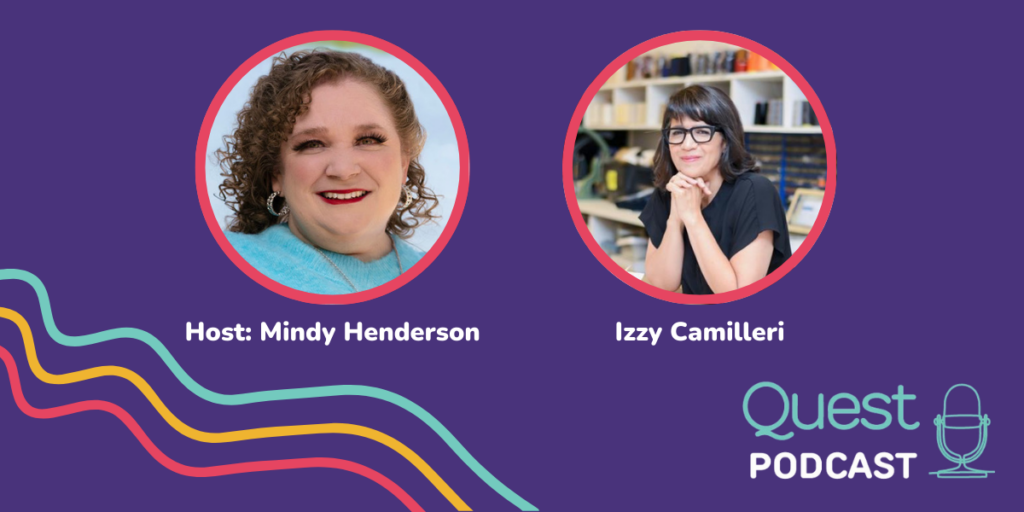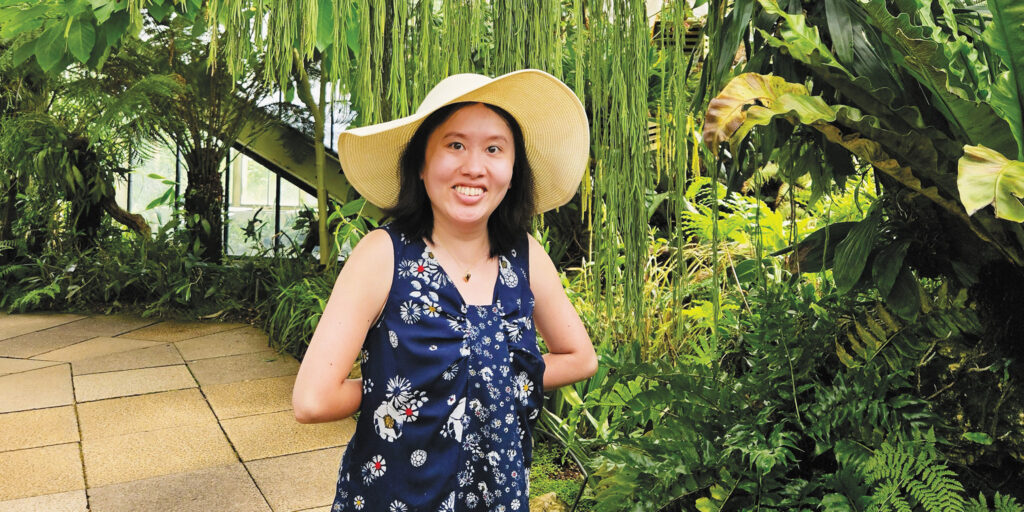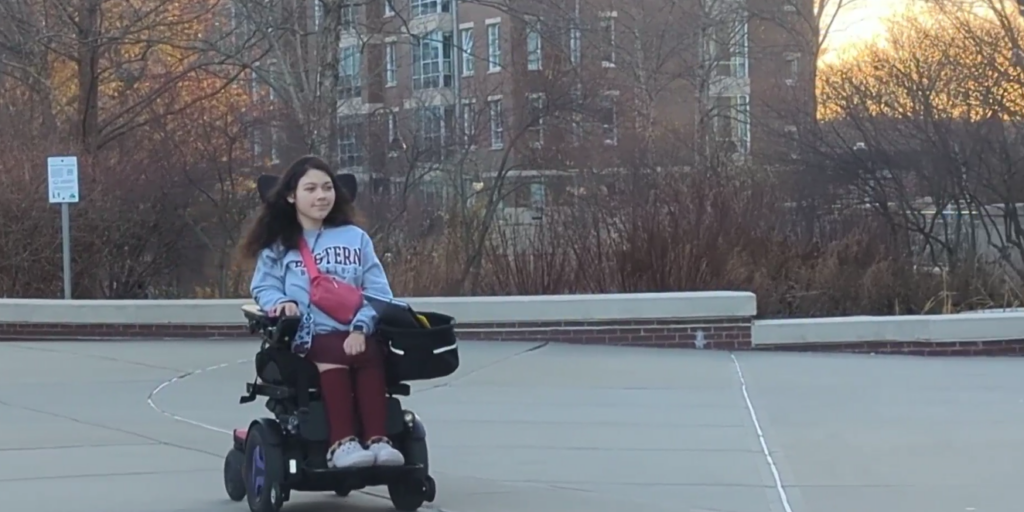
The Complex Beauty of the Unexpected
By Abby Dreyer | Monday, February 3, 2025
5 Second Summary
MDA’s College Scholarship Program provides support to students living with neuromuscular disease as they pursue their academic dreams. Merit-based scholarships are awarded to students who demonstrate leadership qualities and are making an impact in the neuromuscular community. More information and application criteria can be found at mda.org/scholarship.
Abby Dreyer is a 2024 MDA College Scholarship recipient.
Read more personal stories from members of the neuromuscular community about their College Experience as they share their journey, accomplishments, advice for accommodations and overcoming barriers, and insights into navigating college life with a disability.
Abby Dreyer is an honors student at Eastern Connecticut State University who lives with spinal muscular atrophy (SMA). She enjoys learning other languages, trying new things, writing, watching movies, and staying active. Even though she was born and raised in the smallest state in the country, Rhode Island, she has always had big ideas and is fervent about disability advocacy.
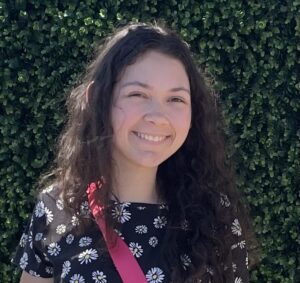
Abby poses in front of a background of greenery.
If I had to describe my first semester of college in one word, it would be unexpected. I’ve always been a planner. In high school, I planned everything from the order I’d complete my homework in, to when I’d go to the bathroom, and everything in-between. Being this way, I began preparing for college very early. I researched how to request accommodations and which schools had the best accessibility, chose a school the perfect distance from home, talked to other college students living with disabilities, and planned for just about anything else that could come up.
The one thing that I didn’t plan on, however, was not having a PCA (personal care attendant) for my first semester of college. I had talked to a plethora of people and organizations about how to attain one, and they all had half-answers or nonchalantly reported that they simply applied through state services. However, it was this subtle catch that ended up being my downfall. I chose a college out of state; and even though it’s less than an hour from my house, because of this, I didn’t qualify for certain state services. The only services I could receive would take months to enact, so I was left in an unexpected predicament.
They say necessity breeds innovation. It was during my transition to college that I truly realized what this meant. Once I realized I would not have a PCA for the beginning of the school year, I had two weeks to figure out how to adapt my lifestyle to minimize the amount of care I needed; as I couldn’t hold my family hostage to help me at all times.
So, being the planner I am, I got to work. I’d always thought about things in a certain way, however by examining it from all angles to figure out how I could potentially work around it, I realized that the barrier I’d perceived wasn’t, in fact, the barrier at all.
For example, I had always needed help to get my school supplies out on my own when I was in high school. Once I looked at the problem, I realized that it wasn’t that I couldn’t get out my school supplies on my own, the barrier was that I couldn’t reach my backpack on the back of my chair. So, I scoured the internet; and, while it wasn’t exactly easy, I eventually found a bag that attaches to the front of my chair, allowing me to access my school supplies. With this new adaptation, I wondered what other boundaries I could push with this mentality.
I could’ve predicted that I would solve predicaments. But if you told me I would figure out a way to use the bathroom on my own a year ago, I would have thought you were crazy. Using my new logic, I deduced that the conflict wasn’t that I couldn’t go to the bathroom independently, the barrier was that I couldn’t transfer. And, after another long internet search later, I discovered an external catheter that I could use by myself. Not only has this been a game-changer for my college life, but also for other parts of my life; as I can now go out with friends, without being on a bathroom time-limit.
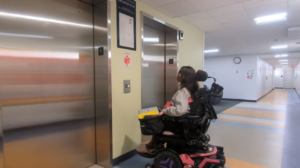
Abby navigates the wide open campus on her way to class.
With all this troubleshooting, I wasn’t exactly focused on the college experience. Before all this happened, I’d set the goal of forging new connections. I had found that living with a neuromuscular disability sometimes made making new friends more difficult and I wanted to have a better social life than I did in high school.
I made some attempts during the first couple of weeks; but I soon stopped trying as hard, as I was preoccupied trying to resolve barriers to my independence. It was during that exact time that another unexpected thing happened. Even though I was preoccupied, even though I’m an honors student who was constantly doing homework instead of socializing, despite everything: friends found me. Genuine, lasting ones too.
So, what’s the point of this story? I’m not telling you that all of your problems are magically going to be solved with some innovation and a time crunch, or that you should stop trying to make friends because they’ll always find you. But, the reality is, that no amount of planning can prepare you for everything.
If I could offer one piece of advice to all of you going off to college soon, it would be to trust yourself. You’re more capable and resilient than you realize. Sometimes things are just going to go wrong, and sometimes it’ll seem like nothing is going right. Transitioning to college is huge, and, especially for us living with disabilities, it’s going to be anything but easy. But just keep pushing through. You can’t stop bad things from happening, so sometimes you just have to roll with it. Solve one problem at a time. Focus on all you’ve accomplished and keep your eye on all the successes to come.
Next Steps and Useful Resources
- More information and application criteria for the MDA’s College Scholarship Program can be found at mda.org/scholarship.
- For more information about the signs and symptoms of Spinal muscular atrophy (SMA) , as well an overview of diagnosis and treatment concerns, an in-depth review can be found here.
- MDA Community Education empowers the neuromuscular disease (NMD) community through high-quality educational programs and materials. Learn valuable skills for overcoming common barriers in Access Workshops, get up-to-date information from experts in the field and connect with other families at Engage Symposiums, print out educational materials, and more.
- MDA’s Resource Center provides support, guidance, and resources for patients and families. Contact the MDA Resource Center at 1-833-ASK-MDA1 or ResourceCenter@mdausa.org
- Stay up-to-date on Quest content! Subscribe to Quest Magazine and Newsletter.
Disclaimer: No content on this site should ever be used as a substitute for direct medical advice from your doctor or other qualified clinician.


